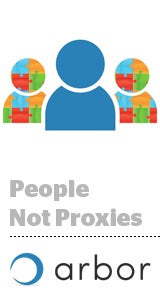 There are walled gardens, and then there’s Arbor.
There are walled gardens, and then there’s Arbor.
The startup, which raised a $6.5 million round on Tuesday, bills itself as a marketplace for people-based data. Think of it as a supply-side platform mated with a co-op for deterministic data.
The bulk of the round, led by Canaan Partners with participation from First Round Capital, will go toward engineering and doubling the Arbor team over the next year to about 40 people. International expansion is also on the docket – Europe, then Asia – although the US is priority No. 1.
The technology underpinning Arbor is built off the concept of a device graph. Publishers put their first-party data in and Arbor makes connections through unique hashed identifiers, which it shares back with the supply source. The graph grows each time there’s a match. Advertisers can buy access to the data and publishers can combine multiple sources to increase their own scale. Arbor declined to name specific clients.
Adobe has a cross-device data co-op on the market, while MediaMath’s Helix (formerly Adroit) combines online shopping patterns and spins them out into larger consumer segments. But those offerings are geared mainly toward marketers, while Arbor’s platform is aimed more at the data owners.
“Everything is keyed around the idea of people-based data, not cookies,” said David Yaffe, CEO of Arbor. “We’re looking to help publishers and app developers control their data assets and get to market without just signing them over wholesale.”
The niche the company fills has been created by the growing imperviousness of major players like Google and Facebook. As the garden walls go up, so do advertiser and publisher hackles.
“First-party data assets are extremely valuable and also increasingly inaccessible from internet companies and telecommunications companies,” Yaffe said.
Yaffe’s past experience includes more than five years as a lead product manager at Google, which he joined as part of Google’s acquisition of Invite Media in 2010. It became pretty clear to Yaffe and co-founder Nikhil Dixit, another Google and Invite Media vet, that publishers and advertisers needed more control over the use and monetization of their proprietary data.
Facebook, which popularized the concept of people-based advertising with its Atlas ad server, as well as Google, have access to vast amounts of logged-in user data, which makes them compelling from a cross-device perspective.
But one of the primary complaints publishers and advertisers have about Facebook and Google is that the duo keep their respective deterministic data kingdoms under lock and key.
It’s certainly made them a lot of money. As LUMA Partners observed in a recent research note, “These two players are taking the lion’s share of incremental digital ad spend, which is unhealthy for the rest of the ecosystem.”
The walled gardens themselves would position it a bit differently.
“We [Google and Facebook] each have a really valuable data asset which is proprietary and there is a lot of PII attached to that,” said Paul Pellman, director of Google Attribution 360 at AdExchanger’s Omni.Digital conference in Chicago on September 8. “We make it available within our walls for targeting and measurement, but we’re hesitant to let the data outside of our walls.”
Advertisers and publishers obviously aren’t about to stop working with Google and Facebook anytime soon, but they are “looking for alternatives,” Yaffe said.
“We’re not looking to replace those other channels, but to add knowledge and the ability to have insight when working in other environments and when working outside of those walled gardens,” he said.
Founded in 2014, Arbor has offices in San Francisco and New York with plans to use some of its Series A to potentially open an additional office focused on engineering.
This is Arbor’s second round of funding. The first, a $2.55 million seed round led by First Round Capital, included a number of industry heavies and angel investors, such as MoPub co-founder Jim Payne, LiveIntent CEO Matt Keiser and Unacast CRO Chris Cunningham.
Arbor also hired a new CRO, Paul Turner, who joined the company after a two-year stint as chief commercial officer at Adbrain.















